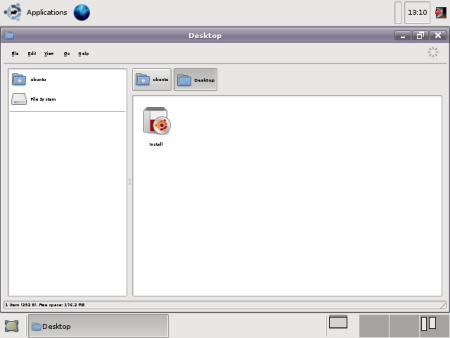Quick Look: Xubuntu Beta 2
Monday 1st May 2006
So far, we have had Ubuntu, Kubuntu and Edubuntu, covering GNOME and KDE - the two major desktop environments. Now, for the Dapper Drake release, XFCE is to be added to the mix in the form of Xubuntu. Of course, XFCE has been installable before, but this is the first time it gets its own special treatment.
Using the wonders of QEMU, you can quickly try out the LiveCD, although quickly might not be the right word if you haven't stuck kQEMU on the side.
Anyway, the first image on the desktop that greets you is this little animated rodent having a fun run:
Once the desktop had finished loading, the first thing that struck me is how much Xubuntu looks like... Ubuntu. If you take a look at xfce.org, especially the screenshots page, you can see how XFCE normally looks. Instead, Xubuntu looks like this:
You can find plenty more screenshots of Xubuntu at osdir.com.
It would appear that this has happened to ease the transition for anybody moving from GNOME, or perhaps even Windows. Running application appear in the bottom panel rather than top, you get an applications menu in the top left, and so on.
Of course, there's really only one important question: is it a good idea? The answer is: sort of. On the one hand, those that use XFCE already may be disappointed. On the other, it succeeds in essentially creating a lightweight version of Ubuntu.
In my opinion, it is the latter option that is probably more important. Those that want to use XFCE in its usual form may only have to play around with some options, but it could offputting to some. After all, Xubuntu will probably gain more users by targeting new users unfamiliar with XFCE or even Linux, than by targeting existing XFCE users.
But enough of that. Xubuntu differs from Ubuntu in more than just desktop environment - there's also the selection of packages. Gone is the somewhat heavyweight OpenOffice.org, instead replaced with Abiword. Gnumeric might also be nice to have, although we'll have to wait a month to see if it turns up in the end.
Other than that, there are just the usual suspects, although relatively few of them - Firefox, Thunderbird, the GIMP, GAIM, and all the applications that come bundled with XFCE. One such application is Thunar, the file manager, which behaves suspiciously similarly to Nautilus.
I didn't get the chance to test the installer, although the fact that the CD doubles up as both LiveCD and installation CD is something that I hopes becomes more common.
Xubuntu should also carry many of the strengths of Ubuntu, since, beyond the desktop environment and choice of office suite, they use the same base system (so far as I'm aware). This means that you can quite easily use any applications already available for Ubuntu in Xubuntu.
If you're considering using Xubuntu in the future, it really depends on what you want. If you've fallen in love with XFCE, consider whether you like the changes that Xubuntu has made. If, on the other hand, you just want a lightweight distribution, Xubuntu may be worth keeping an eye on.

